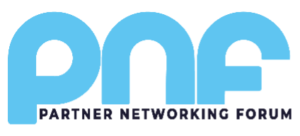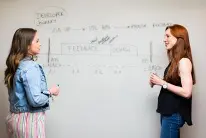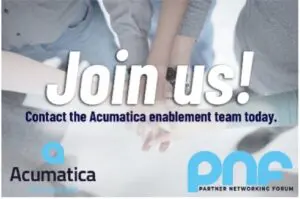“People ask me all the time why I bet my entire business on Acumatica. It’s the only solution we sell. And while there are many reasons, innovation and community are two of the most important ones,” offered Patricia Bennett when we sat down to discuss this article. “The Partner Networking Forum [PNF] is one of the ways that this channel is really different. The PNF enables, develops, supports and grows the channel.”
Most publishers have groups where their resellers and users can come together to share ideas, but many of them die on the vine for a multitude of reasons. Acumatica is different; and what really sets this group apart is that it is completely partner-run. Why does that matter? It puts the power to define the channel into the partners’ hands. The publisher is always going to be the designer of the eco-system, but with a robust partner group like the PNF, you open up opportunities to redefine, tweak, improve and grow the individual partners and the channel as a whole.
If you are curious about how to best get up to speed and be successful with your Acumatica practice, the PNF is for you! This article illustrates a little bit of what we give and get from our partnership with Acumatica, and this amazing group of people that inhabit the ecosystem. Download the full PDF here.
Let’s explore more with a Q&A with three of the founding members of the PNF and one notable Acumatica team member.
Meet the Acumatica PNF Founders and Key Contributors

Patricia Bennett
Founder of PC Bennett Solutions
Patricia Bennett is founder and CEO of PC Bennett Solutions. With over 20 years of experience, Bennett is a respected technology executive and thought leader in the ERP industry. She has developed numerous applications, many specifically for the automotive industry, and has been responsible for hundreds of successful ERP implementations.

David Gelula
Co-owner of Somerset Technology Solutions
Acumatica Cloud ERP is David Gelula’s passion project of the last few years. He spent his previous tenure working with Sage CRM and Sage 300 ERP but happily moved on from those dated technologies to focus on a modern, next-generation system. Mid-sized distribution and light-manufacture/assembly operations are among his client specialties as he enjoyed years of progressive responsibility in the management, operations, and brand management of these environments before leaping the fence from client to consultant.

Randy Forkner
President of Collins Computing, Inc.
After dominating in the Microsoft Dynamics GP space for decades, Collins Computing, Inc. became an Acumatica Cloud ERP partner in 2014. Randy Forkner is the president of Collins Computing who, incidentally, is the current reigning Acumatica Distribution Partner of the Year for 2022.

Sanket Akerkar
Acumatica’s Chief Revenue Officer
In January of 2021, Acumatica named Sanket Akerkar as their Chief Revenue Officer. He is responsible for leading worldwide sales, business development, customer success, and the technical enablement and business relationship with Acumatica partners and resellers.
These four integral folks involved in the Partner Networking Forum agreed to sit down with us and explore the benefits of joining the ever-evolving group.
What IS the PNF?
The PNF Mission Statement
“The Partner Networking Forum is an organization of [Acumatica] resellers who collaborate with each other, and the Acumatica Executive team, to prosper in the business of selling and servicing Acumatica ERP.”

The Partner Networking Forum (PNF), previously known as the Partner Owner Forum, is a network of business owners that works with, but operates independently of, Acumatica. The PNF is divided into multiple functional groups, each dedicated to improving the overall performance of all partners: giving help where needed, sharing lessons learned, what’s working, what’s not working, challenges of the market, and more.
“What is the PNF in your words?”
“[The PNF] is a grouping of Acumatica partners that allows us to collaborate and network to improve our businesses, but also the platform and community as a whole,” says Patricia Bennett, CEO of PC Bennett Solutions (an original member of the PNF).
“It [brings] together the people driving Acumatica consulting,” David Gelula agrees (owner of Somerset Software Solutions).
Sanket Akerkar (CRO of Acumatica): “The PNF exists to enable partners to talk about and improve their own performance inside the ecosystem. It helps to shape how they think about resourcing, business structure, business strategy, competencies, capacity, and what we can do to facilitate growth. It creates a formal path for product and program feedback and helps Acumatica understand initiatives and steps they can take to move the ecosystem forward.
The main distinction is that it is partner-organized. [The PNF members] set and define the agendas for themselves. Having that level of control is beneficial.”
Randy Forkner (president of Collins Computing): “Networking is in the name on purpose; these conversations are important for our businesses,” he says. “By improving the ecosystem, we all grow.”
The Partner Networking Forum is a rising tide that aims to lift all boats.
Who makes up the PNF?

You don’t need to be a large “boat” to join the Partner Networking Forum.
The network is made up of executives and owners from active Acumatica Resellers of all sizes and experience levels; anyone in leadership is welcome. The meetings exist to address global problems and share solutions, not on selling or marketing; therefore, there are no ISVs and no staff members involved. This allows the groups to speak freely and stay laser-focused on higher-level issues.
Another group of people are notably excluded from most PNF meetings: Acumatica executives.
“Who can join the PNF?”
Patricia Bennett: “Business owners of value-added resellers of Acumatica.”

Randy Forkner: “It’s not designed for salespeople or marketing people. It’s a chance for business owners to talk candidly about what they are dealing with at a high-level.”
David Gelula: “Active Acumatica Reseller partners only (no ISVs). It doesn’t have to be the actual “owner” of the business, but the person who attends has to have the Practice Business Owner designation/certification. All are welcome that meet these criteria: new or old, experts or novices.”
“Most of the meetings are partners only,” explains Sanket Akerkar. “Acumatica doesn’t participate in many of them, and that’s part of the design principle behind [the PNF]. It’s partner-organized, partner-led, and partner-driven.”
Acumatica only becomes involved to hear what the partners have to say and works with them to address the concerns raised by various committees. In this regard, the PNF acts as a conduit from the customer to the platform. This is how meaningful progress is made.
How is the PNF structured?

The PNF is divided into seven subcommittees, who each meet virtually on a monthly basis to discuss their specific action items. Then, the entire Forum meets in person to present reports on the progress of the specific initiatives, hear feedback, and engage in open forum topics and network as a group.
Divide and conquer: this allows each group to devote their limited energy (we all have businesses to run, after all) to a single topic at a time.
The in-person get-togethers occur twice yearly, at Acumatica Summit and the Boston Roadshow (pandemic permitting, of course), and these meetings are the only ones which Acumatica executives attend.
The Subcommittees
There are seven separate subgroups that exist in the PNF:
- Leadership Group
- Marketing Group
- Mentoring Group
- Sales and Sales Ops
- Best Practices group
- Enablement Group/Implementation
- Education/Certification group
An eighth group (the Product Group) is in development.
“What are the meetings like?”
David Gelula: “We have a structure for the in-person meetings. About a day and a half, which ends up roughly one-third of the time the groups give reports on progress; one-third presentations by Acumatica execs; one-third of the time on open forum topics and breaking out into the various groups.

The [Acumatica] executive presentations vary. This year was the first time that Christian Lindberg was there, and he presented us what the Acumatica strategy with ISVs is (what they are trying to do, a comprehensive overview, what their goals are). Todd Kuhns always presents – very features-based, always interesting, and he covers product development. Sanket Akerkar, Sean Chatterjee, and Ali Jani will talk a lot about strategy at the corporate level, what they are trying to do, and how they are trying to help the channel work together. Most of the time what happens is Acumatica leadership will come to the meetings with some level of organization and presentation, and the other half is Q&A.”
Patricia Bennett: “We don’t want too much structure, though, in the regular meetings. We like that it is more fluid. The emphasis is on the end goal – not on sticking to a strict structure.”
Sanket Akerkar: “Acumatica doesn’t participate in [most of the meetings], which is by design. The PNF is Partner-organized, led and driven. In those cases where Acumatica staff is invited, we engage in mainly two ways: 1) sets of feedback or ideas for them to consider in terms of how our ecosystem works and programs that are available to support and further develop the partner’s practice and 2) sometimes cover areas where we want to take the technology. Which makes sense, since it relates directly to what the partners do each day to support the product, take care of the customers related to what the product gives to you.”
Randy Forkner: “The small groups typically meet monthly to discuss the 3-4 pillars each group wants to work on. For example there’s a Sales group and they work on anything sales-related, like focusing on sales improvement or ideas for opposing competition like NetSuite. They will compile a list of best practices, and present the ideas to the rest of the PNF group.”
Tracking Success of the PNF

Sanket Akerkar has made it clear that Acumatica values the “two-way street” of collaboration that the PNF provides. It helps shape a lot of what Acumatica offers to its partner
ecosystem and how they support their partner network. This method of co-creation has led to numerous successes over a short time, and Acumatica is willing to engage with the Forum even more, if needed.
Members themselves report that they are pleased with the progress. Very successful and popular programs (such as The Lunch & Learn Program and the FastTrack Implementation) were created from the PNF’s suggestions. It’s easy to see the value that being a part of the group provides; while all Acumatica partners eventually got to utilize the Lunch and Learn program, the PNF members got to design it with their recommendation.
The improvements born from the PNF benefit all Acumatica resellers, which in turns benefits all Acumatica users and the brand itself.
“How do you measure the PNF’s success?”
Randy Forkner: “Seeing that we impact change (toward Acumatica, to the industry, our businesses): that is success. Improve how partners work individually and together, improve the relationship with Acumatica, and improve the community. We’ve been very successful in improving the sense of community and improving partner-to-partner relationships.”
Sanket Akerkar: “I look at it at a macro level. At the broad ecosystem level, I ask 1) is our partner ecosystem growing? 2) For each of our partners, is their Acumatica practice healthy and profitable and successful relative to their other practices? Or for stand-alone practices, are they meeting and exceeding their business goals? That’s what I look at and care about: making sure our partners are performing very well. The role the PNF plays is helping new partners define the most effective way to run their practice and make it successful. It comes into profitability, but efficiency as well; finding and securing resources, leveraging lessons learned.”
Patricia Bennett: “Success means knowing that partners are getting something out of the meetings. If we’re able to make changes that improve the businesses, we will succeed.”
David Gelula: “The group is not highly organized, but that is somewhat by design. We call it successful if we meet each month to update each other, in bigger groups every quarter to present a few findings and lessons learned, and in person at Summit each year to really dive into the details. Better to keep chipping away at it and not take on too much at once.”
Join the Partner Networking Forum

When asked if a reseller should join the Acumatica Partner Networking Forum, the response was emphatic. The improvement seen by those in the community exceeds that of an individual acting alone.
“There are a lot of benefits,” says Patricia Bennett. “Even just seeing the issues other people are having. The partner community works together to improve ourselves.”
Sanket Akerkar: “Our partner ecosystem is different. When you go to a PNF event, it’s not a silo; it is a free collaborative and self-supporting environment. They aren’t hiding information or best practices; they are sharing all of the things they’ve learned around how to become more efficient and take care of customers.”
There is no sense of competition in the PNF. Randy Forkner explains, “it goes without saying that we all approach the [PNF] with ethical business practices. Come in open-minded and be prepared to share.”
“Make it about bringing as much as it is about taking,” advises David Gelula. “There is a great sense of camaraderie and great results for those who show up and share and participate. [You can] interact with other people who are on the same journey. Come be a part of it!”

Ready to join?
If you’re a VAR business owner, new or experienced, join the PNF. Membership is free – the only compensation the group requires is your time and effort, and a small conference fee if you attend the Acumatica Summit forum meeting in January.
Take part in the changes that are driving your profitability. To join the Partner Networking Forum, submit a partner operations case and the enablement team will take it from there.
